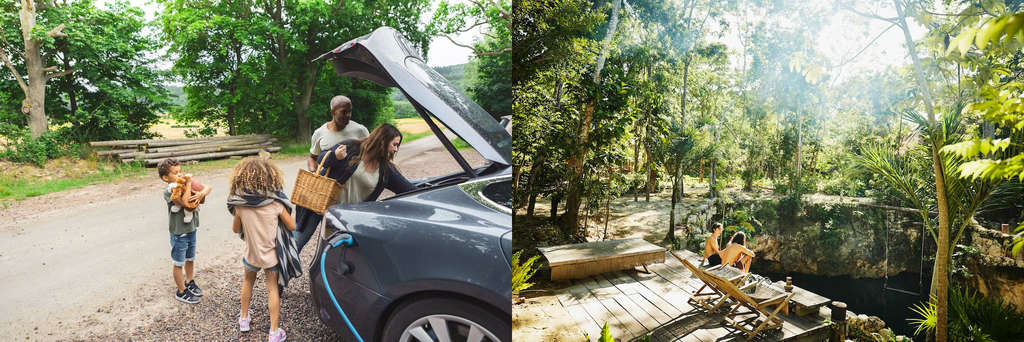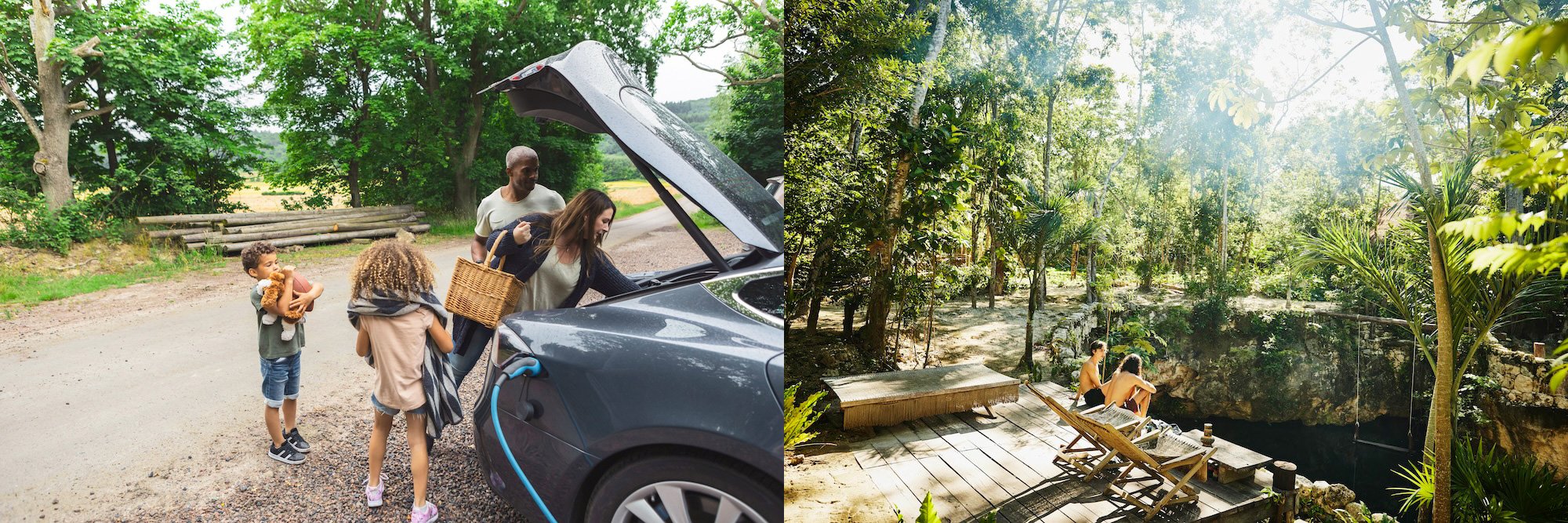Latest Booking.com Sustainable Travel Data Reveals Ongoing Challenges for Consumers & Highlights a Heightened Opportunity for Cross-Industry Collaboration

- New data from the company’s annual sustainable travel research reveals that 45% of people feel traveling more sustainably is important, but not a primary consideration when planning or booking travel
- One-third (33%) feel the damage already done is irreversible, and that the choices they make are not going to change that, while a quarter of travelers (25%) don’t believe climate change is as severe as people make it out to be
- With 44% believing governments hold the most potential for countering economic impacts of travel, and 43% thinking travel service providers hold the key to counteracting the environmental factors, these new insights illuminate the need for increased collaboration to remedy nascent consumer feelings of powerlessness and ensure the continued prioritization of a more sustainable travel industry
AMSTERDAM - Today, Booking.com releases new research, with insights gathered from more than 31,000 travelers across 34 countries and territories, exploring the latest consumer attitudes, priorities and influences related to sustainable travel. While the annual research reveals a continued sense of desire and awareness, with 83% of travelers confirming that sustainable travel is important to them, new insights show a sense of weariness could be emerging globally, fueled by the ongoing challenges that travelers experience to make more sustainable travel choices.
The recent study shows that almost half (45%) feel traveling more sustainably is important, but not a primary consideration when planning or booking a trip, and 28% of travelers even report they are tired of hearing about climate change all the time. With this in mind, the opportunity for collective action is more pertinent than ever, in order to ensure that progress toward a more sustainable travel industry remains a priority.
Positive Intentions Meeting New Challenges
Looking ahead, a reassuring 75% of global travelers say that they want to travel more sustainably over the next 12 months, and (43%) would feel guilty when they make less sustainable travel choices. When it comes to motivators among those who want to travel more sustainably, (32%) want to do so because they believe it's the right thing to do.
However, a sense of disillusion towards making more sustainable travel choices may be counteracting those intentions. New areas of exploration researched for the first time this year reveal that some travelers don’t recognize the importance of being more mindful of their impact, as one-third (33%) feel that the damage already done is irreversible and that the travel choices they make are not going to change that. In fact, a quarter of travelers (25%) don’t believe climate change is as severe as people make it out to be - a dismissal of the issue which may well be impacting travel plans.
Moreover, some feel their time spent traveling is too precious to put sustainability at the top of their decision-making list (28%). Not seeing sustainability in action is also contributing to the sense of powerlessness; more than a third (34%) of travelers believe that being more sustainable in a destination that is not implementing sustainability practices itself feels pointless.
Shared Responsibility And The Critical Opportunity For Industry-Wide Enablement
The role travelers feel they can play in tackling the negative impacts of travel also highlights their expectations around collaboration. A noteworthy 71% of travelers say they want to leave the places they visit better than when they arrived (up from 66% last year), and this year’s additional research shows 45% think they themselves have the potential to counteract the social impacts of travel. On the other hand, 44% think governments hold the most potential for countering the economic effects, and 43% believe travel service providers hold the key to addressing environmental factors. Furthermore, 40% of travelers believe that governments are responsible for educating people on the impacts of travel and tourism.
Responsibilities extend to how consumers are being supported to fulfill their intentions. Coming across an accommodation labeled as more sustainable is more appealing to almost half of travelers (45%) and consistency of certification standards is critical to identifying these options with 67% agreeing that all travel booking sites should use the same sustainable certifications or labels. However, the number of travelers who are interested to learn more about why the accommodation was given this label is down 17 percentage points (at 52%) when compared with the same time last year, indicating a need for simple, clear communication that enables easy decision-making regardless of priorities.
Sustainable Silver Linings
Despite the emerging frustrations, travelers who say they are making more mindful choices also feel that more sustainable travel experiences are actually adding value to their trips. New areas of research in this year’s report found that 62% of travelers recognize that they are the best version of themselves when they travel more sustainably and consequently take home this positivity, just as 67% feel that witnessing sustainable practices while traveling inspires them to be more sustainable in their everyday life. Of those who adopted sustainable behaviors on their travels, it was seen as an enhancement for 96% who did tours or activities for authentic, local, and cultural experiences, 93% who shopped at small, independent stores, and 93% who planned their trips so that they could walk, bike, or take public transport.
While many travelers have retained a sense of optimism and a desire to have a more positive impact, there is a critical opportunity for the industry to accelerate efforts to make those choices easier for everyone. It’s important that we continue ensuring that more sustainable options are not only readily available, but also easy to trust and understand. That’s where we believe further education, clear and consistent standards and credible third-party certification of legitimate sustainable practices across the travel experience can really help. While the signals of consumer frustration should be a concern, it’s also a reminder to maintain our focus on the impactful work we know can make a difference not only for travelers, but for communities and destinations everywhere. Danielle D’Silva, Head of Sustainability at Booking.com
Research commissioned by Booking.com and independently conducted among a sample of 31,550 respondents across 34 countries and territories (1,000 from USA, 1,000 from Canada, 1,000 from Mexico, 1,000 from Colombia, 1,000 from Brazil, 1,000 from Argentina, 1,000 from Australia, 500 from New Zealand, 1,000 from Spain, 1,000 from Italy, 1,000 from France, 500 from Switzerland, 1,000 from the UK, 1,000 from Ireland, 1,000 from Germany, 1,000 from the Netherlands, 1,000 from Belgium, 1,000 from Denmark, 1,000 from Sweden, 950 from Croatia, 500 from UAE, 1,000 from India, 1,000 from China, 800 from Hong Kong, 1,000 from Thailand, 1,000 from Singapore, 1,000 from Taiwan, 1,000 from Vietnam, 1,000 from Indonesia, 1,000 from Philippines, 1,000 from South Korea, 1,000 from Japan, 1,000 from South Africa and 300 from Kenya ). In order to participate in this survey, respondents had to be 18 years of age or older, had to have traveled at least once in the past 12 months and must be planning to travel in 2024, and be either the primary decision maker or involved in the decision making of their travel. The survey was taken online and took place in February 2024.
About Booking.com
Part of Booking Holdings Inc. (NASDAQ: BKNG), Booking.com's mission is to make it easier for everyone to experience the world. By investing in the technology that helps take the friction out of travel, Booking.com's marketplace seamlessly connects millions of travelers with memorable experiences every day. For more information, follow @bookingcom on social media or visit globalnews.booking.com. For more information, follow @bookingcom on social media or visit globalnews.booking.com.
Press Office Booking.com
+31 20 709 4743
Booking.com






